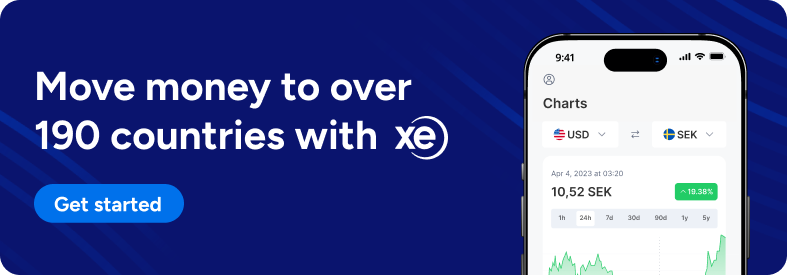- Home
- Blog
- Currency News
- Top 10 Strongest Currencies in the World (2025)

Top 10 Strongest Currencies in the World (2025)
١٣ فبراير ٢٠٢٥ — 7 min read
Table of Contents
Key takeaways
Some currencies hold significantly higher value compared to major global currencies like USD, EUR, and GBP.
Strong currencies are often backed by stable economies, high foreign reserves, and strong trade balances.
Understanding the strongest currencies can help travelers, investors, and businesses make informed foreign exchange decisions.
Ever wondered why some currencies pack more punch than others in the global marketplace? While the US dollar, Euro, and British pound often steal the spotlight, you might be surprised to learn that several other currencies actually hold more value in today's exchange rates.
So, what determines the strength of a currency? Let’s dive right in.
What makes a currency strong?
Currency strength is kind of like a country’s financial report card. It reflects the economic health, stability and global trading power of the country. Let’s take a closer look at some of the key factors:
Economic stability: Countries with robust economies and low inflation tend to have stronger currencies. When prices are stable and the economy can grow steadily, the currency typically follows suit.
Foreign reserves: High reserves of foreign currency help strengthen a nation's currency. These reserves act like a financial safety net, helping to keep the currency stable even when markets get choppy.
Trade balance: When a country exports more than it imports, creating a trade surplus, its currency often gains strength. This positive trade flow means more foreign buyers need the local currency, driving up its value.
Ready to discover which currencies currently rank as the world's strongest? Let's look at the top 10 currencies that stand tall against the US dollar, and understand what makes each one special.
Top 10 strongest currencies in the world
Strongest currencies by exchange rate
Rank | Currency Name | Country | Currency Abbreviation |
|---|---|---|---|
1 | Kuwaiti Dinar | Kuwait | KWD |
2 | Bahraini Dinar | Bahrain | BHD |
3 | Omani Rial | Oman | OMR |
4 | Jordanian Dinar | Jordan | JOD |
5 | British Pound | United Kingdom | GBP |
6 | Gibraltar Pound | Gibraltar | GIP |
7 | Cayman Islands Dollar | Cayman Islands | KYD |
8 | Swiss Franc | Switzerland | CHF |
9 | Euro | European Union | EUR |
10 | US Dollar | United States | USD |
(Up to date as of February 6th, 2025. Exchange rates fluctuate, so check Xe.com for the most up-to-date rates.)
1. Kuwaiti Dinar (KWD) – The strongest currency
Standing at the top of the global currency rankings, the Kuwaiti Dinar showcases impressive strength in the international market. Kuwait's robust oil exports and careful financial management create the perfect environment for currency stability. The government maintains tight control over inflation through:
A strategic currency basket peg system
Substantial foreign currency reserves
Conservative fiscal policies
2. Bahraini Dinar (BHD)
The Bahraini Dinar holds its position as one of the world's strongest currencies through:
A thriving oil export industry
A sophisticated banking and financial services sector
A fixed exchange rate with the US dollar
3. Omani Rial (OMR)
Oman's currency benefits from the nation's economic prowess and strategic monetary management. Key factors supporting the Omani Rial include:
High GDP per capita
US dollar peg for stability
Active government oversight of monetary policy
Strong economic fundamentals
4. Jordanian Dinar (JOD)
Jordan's currency stands out for maintaining remarkable stability despite regional challenges. The Jordanian Dinar's strength comes from:
Carefully controlled monetary policies
A fixed US dollar peg
Steady flow of foreign aid
Strong remittance inflows from citizens working abroad
5. British Pound (GBP)
The British Pound continues to rank among the world's strongest currencies, backed by:
London's position as a global financial center
A diverse and resilient economy
Deep and liquid currency markets
Centuries of economic stability
6. Gibraltar Pound (GIP)
Gibraltar's currency maintains its strength through:
A direct 1:1 peg with the British pound
A robust economy driven by tourism
Thriving financial services sector
Strategic shipping industry
7. Cayman Islands Dollar (KYD)
The Cayman Islands' position as a global financial hub supports its currency's impressive value through:
Strong USD peg at a favorable rate
Sophisticated international banking sector
Well-regulated financial services industry
Stable economic policies
8. Swiss Franc (CHF)
Switzerland's currency stands as a beacon of stability in the financial world, backed by:
Consistent low inflation rates
World-class banking sector
Conservative monetary policies
Long history of economic stability
9. Euro (EUR)
As a unified currency for much of Europe, the Euro derives its strength from:
Extensive economic integration
Large combined GDP of member states
Significant global trade volume
Deep financial markets
10. US Dollar (USD)
While not the highest-valued currency, the US dollar's global influence is unmatched due to:
Dominant position in international trade
Status as primary reserve currency
Deep market liquidity
Global economic influence
FAQs about strong currencies
When it comes to global currencies, certain questions come up again and again. Let's clear up some common curiosities about the world's strongest currencies.
1. What are the strongest currency pairs?
The strongest currency pairs include:
GBP/USD (British Pound/US Dollar)
EUR/USD (Euro/US Dollar)
USD/CHF (US Dollar/Swiss Franc)
These currency pairs attract high trading volumes due to their stability and market depth, making them popular choices for international transactions.
2. Which currency has the highest exchange rate against the USD?
The Kuwaiti Dinar (KWD) currently holds the crown for highest exchange rate against the USD.
3. What is the highest historical exchange rate ever recorded?
In February 1985, the U.S. Dollar Index¹, which works to measure the dollar’s value against a selection of other currencies, reached an all-time high of 164.72².
4. How do I know if a currency is strong?
Watch for these key indicators when evaluating a currency's strength:
Growing GDP showing economic health
More exports than imports
High reserves of foreign currencies
Stable prices and low inflation
Clear, consistent central bank policies
5. Has any currency ever replaced the US dollar as the world’s strongest?
Yes, the British pound once held the top spot as the world's go-to currency. After World War II, the US dollar took over this role as America became the world's largest economy.
6. Which currency has never lost its value?
All currencies appreciate and depreciate over time, but the Swiss Franc (CHF) is a good example of a currency that has remained stable over time due to Switzerland's conservative financial policies and strong banking sector.
7. What is the rarest currency in the world?
You'll find the Seychellois Rupee at the top of this list. With Seychelles' small economy and population of less than 100,000 people, their currency sees very limited circulation globally.
8. Why isn’t the US dollar the strongest currency?
While the US dollar leads in global trade, the exchange rate value works differently. Some currencies maintain higher exchange rates because of their limited circulation, strong oil revenues, or carefully managed financial policies.
9. Which country has the highest-value banknotes?
The Swiss 1,000 Franc note is one of the highest-value banknotes still in circulation.
10. How does a strong currency affect a country’s economy?
A strong currency brings both benefits and challenges:
Makes imports cheaper, benefiting consumers
Increases purchasing power abroad
Can make exports more expensive
May impact international competitiveness
Making the most of your international money transfers
Understanding the world's strongest currencies is just the first step. When it's time to send money across borders, you need a service that combines reliability, value, and security.
Why choose Xe for your international transfers?
Global currency markets never sleep, and exchange rates change constantly. Whether you're investing in foreign markets, running an international business, or supporting family abroad, you need a trusted partner for your cross-border transactions.
Xe brings you:
Competitive exchange rates: Access bank-beating rates that help your money go further.
Clear, upfront pricing: No surprise charges - just straightforward costs you can plan around.
Speed and security: Send money to over 200 countries with confidence, knowing your transfers are protected by industry-leading security.
Real-time updates: Track your money's journey from start to finish with detailed status updates.
Worldwide coverage: Transfer money across borders easily, with support for more than 130 currencies.
Ready to send money abroad? Download the Xe app or visit Xe.com to start your first transfer today.
Curious about the top 10 weakest currencies in the world? Read here.
Citations:
¹ Trading Economics - U.S. Dollar Index (2025)
² Cleveland Federal - U.S. Dollar in the Eighties (1985)
**The information from these sources were taken on February 6.
The content within this blog post is not intended for use as financial advice. This content is for informational purposes only.
Smarter money transfers
Xe combines bank-beating rates, secure transfers, and global reach to make moving money across borders fast, easy, and affordable.

٢ سبتمبر ٢٠٢٥ — 3 min read

٧ أغسطس ٢٠٢٥ — 4 min read

١ يوليو ٢٠٢٥ — 5 min read

٤ يونيو ٢٠٢٥ — 3 min read

٥ مايو ٢٠٢٥ — 5 min read

٧ أبريل ٢٠٢٥ — 5 min read


